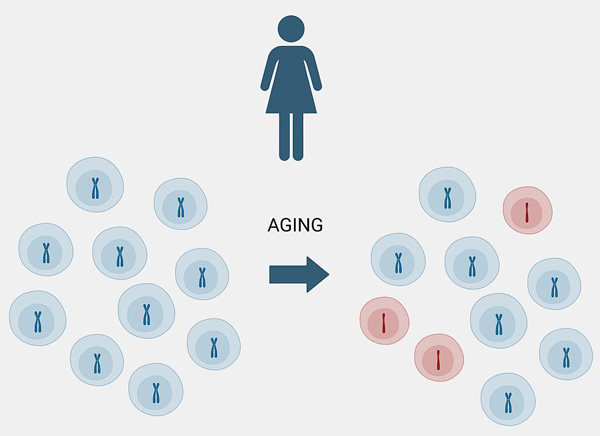A genomic analysis co-led by NIH suggests that the DNA a woman is born with may influence how her cells respond to chromosomal abnormalities acquired with aging.
June 16, 2024 – Researchers have identified inherited genetic variants that may predict the loss of one copy of a woman’s two X chromosomes as she ages, a phenomenon known as mosaic loss of chromosome X, or mLOX. These genetic variants may play a role in promoting abnormal blood cells (that have only a single copy of chromosome X) to multiply, which may lead to several health conditions, including cancer. The study, co-led by researchers at the National Institutes of Health’s (NIH) National Cancer Institute, was published June 12, 2024, in Nature.
As some women age, their white blood cells can lose a copy of chromosome X. A new study sheds light on the potential causes and consequences of this phenomenon. NCI
To better understand the causes and effects of mLOX, researchers analyzed circulating white blood cells of nearly 900,000 women across eight biobanks, of whom 12% had the condition. The researchers identified 56 common genetic variants—located near genes associated with autoimmune diseases and cancer susceptibility—that influenced whether mLOX developed. In addition, rare variants in a gene known as FBXO10 were associated with a doubling in the risk of mLOX.
In women with mLOX, the investigators also identified a set of inherited genetic variants on the X chromosome that were more frequently observed on the retained X chromosome than on the one that was lost. These variants could one day be used to predict which copy of the X chromosome is retained when mLOX occurs. This is important because the copy of the X chromosome with these variants may have a growth advantage that could elevate the woman’s risk for blood cancer.
The researchers also looked for associations of mLOX with more than 1,200 diseases and confirmed previous findings of an association with increased risk of leukemia and susceptibility to infections that cause pneumonia.
The scientists suggest that future research should focus on how mLOX interacts with other types of genetic variation and age-related changes to potentially alter disease risk.
Who: Mitchell Machiela, Sc.D., M.P.H., Division of Cancer Epidemiology and Genetics, National Cancer Institute
The Study: “Population analyses of mosaic X chromosome loss identify genetic drivers and widespread signatures of cellular selection (link is external)” appears June 12, 2024, in Nature.
About the National Cancer Institute (NCI): NCI leads the National Cancer Program and NIH’s efforts to dramatically reduce the prevalence of cancer and improve the lives of people with cancer. NCI supports a wide range of cancer research and training extramurally through grants and contracts. NCI’s intramural research program conducts innovative, transdisciplinary basic, translational, clinical, and epidemiological research on the causes of cancer, avenues for prevention, risk prediction, early detection, and treatment, including research at the NIH Clinical Center—the world’s largest research hospital. Learn more about the intramural research done in NCI’s Division of Cancer Epidemiology and Genetics. For more information about cancer, please visit the NCI website at cancer.gov or call NCI’s contact center at 1-800-4-CANCER (1-800-422-6237).
About the National Institutes of Health (NIH): NIH, the nation's medical research agency, includes 27 Institutes and Centers and is a component of the U.S. Department of Health and Human Services. NIH is the primary federal agency conducting and supporting basic, clinical, and translational medical research, and is investigating the causes, treatments, and cures for both common and rare diseases. For more information about NIH and its programs, visit www.nih.gov.
NIH…Turning Discovery Into Health®
Source & photo: NIH








